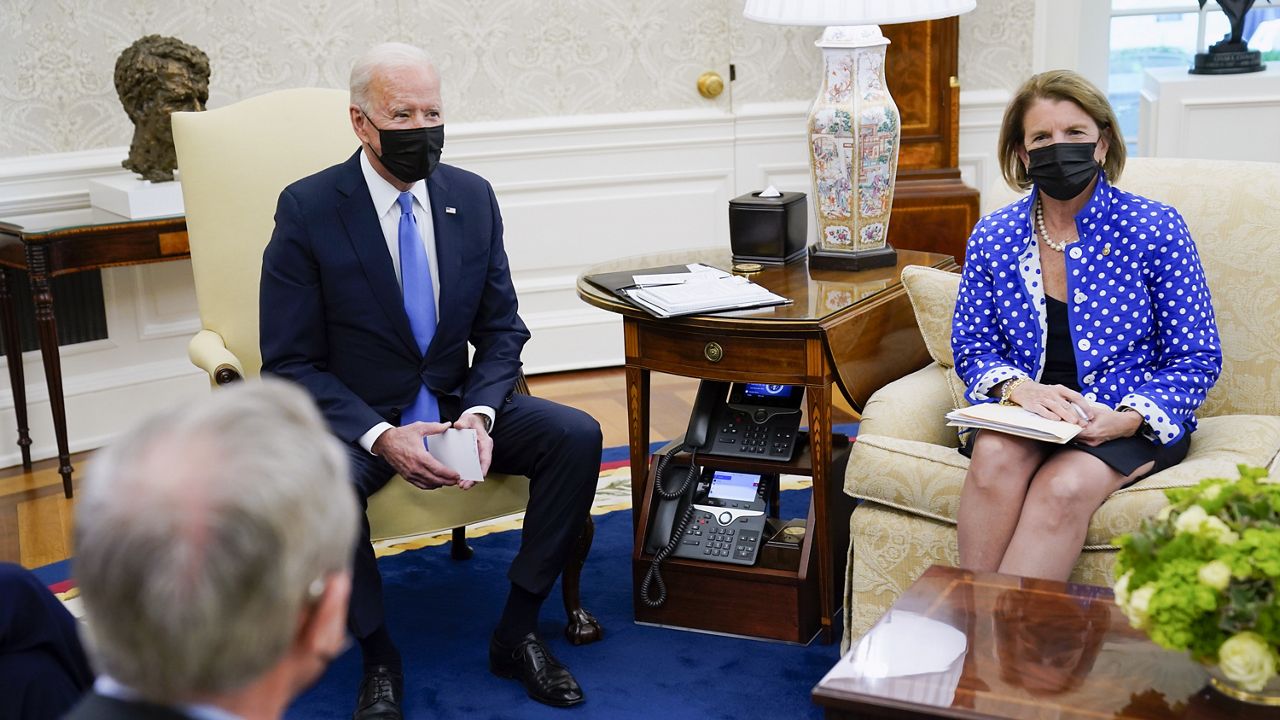Negotiations on an infrastructure package between President Joe Biden and Sen. Shelley Moore Capito have broken down without reaching a consensus, the White House and the West Virginia Republican confirmed in separate statements Tuesday.
The news was first reported by Punchbowl News and quickly confirmed by Axios.
White House Press Secretary Jen Psaki said in a statement that Biden spoke to Capito and informed her "that the latest offer from her group did not, in his view, meet the essential needs of our country to restore our roads and bridges, prepare us for our clean energy future and create jobs."
The president "offered his gratitude to her for her efforts and good faith conversations, but expressed his disappointment that, while he was willing to reduce his plan by more than $1 trillion, the Republican group had increased their proposed new investments by only $150 billion," Psaki continued.
President Biden will instead engage with a separate group of bipartisan lawmakers to try and reach a consensus on infrastructure, having already spoken to Sens. Sinema, D-Ariz., Cassidy, R-La., and Manchin, D-W.Va., on Tuesday.
"He urged them to continue their work with other Democrats and Republicans to develop a bipartisan proposal that he hopes will be more responsive to the country’s pressing infrastructure needs," Psaki said, adding that the president would work with them while in Europe.
"I spoke with the president this afternoon, and he ended our infrastructure negotiations," Capito wrote in a statement earlier Tuesday.
“While I appreciate President Biden’s willingness to devote so much time and effort to these negotiations, he ultimately chose not to accept the very robust and targeted infrastructure package, and instead, end our discussions," Capito wrote, adding that she was "disappointed" by Biden's decision to end their negotiations.
Biden initially sought a $2.3 trillion infrastructure package but, trying to win support from across the aisle, has since signaled a willingness to go as low as $1.7 trillion. He, however, has said he wants to see $1 trillion in new spending.
The Republicans’ initial offer was $568 billion, but they recently increased their offer to $928 billion, which includes $257 billion in new spending.
On Friday, the White House said that the counteroffer still does not meet its "objectives to grow the economy, tackle the climate crisis, and create new jobs.”
The two sides also remain at odds over how to pay for the package, with Republicans firmly opposed to Biden’s proposal to raise taxes on the wealthy and corporations, and the president rejecting the GOP’s plan to use unspent COVID-19 relief aid.
Psaki said Monday that these talks are just one of “several paths” available toward overhauling the nation’s roads, bridges and more.
Negotiations with Capito have been Plan A for months, but other two paths, Psaki said, include a separate Democratic-led bill. On Friday, Rep. Peter DeFazio, D-Ore., chairman of the House Transportation and Infrastructure Committee, unveiled a plan for spending $547 billion over the next five years on road, mass transit and rail projects. The committee will mark up the legislation this week.
Psaki said DeFazio’s proposal has “a lot of overlap” with Biden’s American Jobs Plan.
But DeFazio’s efforts might not find Republican support, either. GOP members of his committee on Friday said his “bill moves even further to the left to appease the most progressive members in the Majority’s party."
The third potential pathway, Psaki said, could be other Republicans and Democrats who are eager to pass infrastructure negotiation joining in discussions that could move the parties closer to an agreement.
“So we'll look forward to seeing what they have to offer and what conversation we can have with them” Psaki said.
The Biden administration, if it cannot find bipartisan support, could push for a package to be passed through the budget reconciliation process, which would require just 50 votes and Vice President Kamala Harris’ tie-breaking vote in the Senate.
But that strategy would present its own challenges, namely securing the backing of Sen. Joe Manchin, the moderate Democrat from West Virginia.
While Machin has voiced support for an infrastructure overhaul, he also has insisted on finding bipartisan support. He reiterated to NBC News last week that he doesn’t think Democrats should use the reconciliation process to pass an infrastructure bill.
Psaki's statement Tuesday reiterated Biden's red lines on any infrastructure package: "He will not raise taxes on Americans who make under $400,000 and he will not accept inaction as the outcome."
"To ensure that the American Jobs Plan moves forward on a timely basis, the President spoke with Speaker Pelosi to consult with her on efforts to move forward on a jobs package in the House this month," Psaki added. "In the same regard, the President also spoke with Senate Majority Leader Schumer to discuss the need to commence work on the budget resolution process so that legislation to advance the President’s economic priorities and tax reform plans could move to the Senate floor in July."
"The President is committed to moving his economic legislation through Congress this summer, and is pursuing multiple paths to get this done," Psaki concluded.
Spectrum News' Ryan Chatelain contributed to this report.



